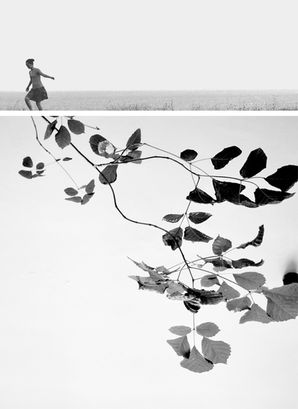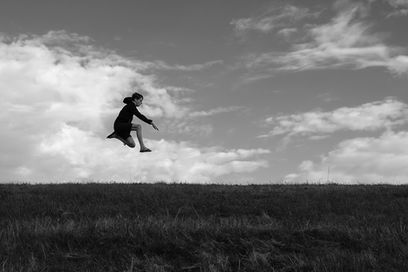
LIVES BEYOND BINARISM
June 18, 2021
INTERVIEW
PHOTOGRAPHY Agata Lo Monaco
INTERVIEW Karin Svadlenak
Born in Sicily, since 2015 Agata Lo Monaco has been living in Germany in the Frankfurt area. She began to approach photography in 2007, during her studies at the Accademia di Belle Arti in Catania in Sicily. It was at that time that she created her first photo reportage, Festivals in Sicily, which has been applauded on a national level. The photo La presa della bandierina ("The Conquest of the Banner") is exhibited at the Museum of Contemporary Art (MACRO) in Rome. Her reportage on the life of outsiders and "gitanos" in the "cuevas" of Sacromonte in Granada was published in "La Repubblica" online.
Agata's work also focuses on the themes of sexuality and gender, and it is a sample of that work that we have illustrated this interview with. We are publishing this as a contribution to Pride month to draw attention to the beauty of diversity.

“I have to say that fortunately today, in 2021, I feel that the situation is changing. There is more and more talk of gender issues and the new generation seems very interested in what are the rights of all, not excluding anyone. So I'm glad if, in my own small way, I helped open someone's mind at the time.”
IN CONVERSATION WITH AGATA LO MONACO
THE PICTORIAL LIST: Agata please tell us about yourself. How did you become interested in photography?
AGATA LO MONACO: I am an islander. I was born in Sicily, Italy. Since I was a child, I have always liked to observe things and people. I have always been very curious and I was looking for a way to express myself. I have never been a great communicator with words. Photography has helped me to express my interest in people and the world, my vision of things. That is why I decided to study fine arts and from there I delved into the field of photography. Today I live and work in Germany.
TPL: Where do you find inspiration?
ALM: I draw inspiration from stories and the emotions they reflect. I like to talk about human beings in their diversity, and I like to question the concept of 'normality'. In the same way, I want to talk about what would otherwise not be told, or only known to the few. I need an emotional connection to be able to pick up the camera.
TPL: How did you begin photographing the drag scene?
ALM: I had my first photographic approach with the drag scene in Catania in 2013. I had the opportunity to photograph the Drag King group "Eyes Wild Drag" and the great American performer and Drag Queen Monique Fauxnique. One of my shots today is part of the book "The Naked King" a drag king archive in Italy, ETS Editions, with the faces and stories of protagonists of the queer world.
TPL: What was the impetus?
ALM: During a conference "Por la despatologización trans e intersex" I honored a sexologist and a group of wonderful people, some in the transition process and others already with years of activism behind them. This is the case, for example, with the activist Kim Pérez. From that moment on, a huge mental and emotional connection was created that I had never before felt. That was the start of "Nosotres – Lives beyond binarism".
TPL: You have spent five months capturing the world and everyday life of trans people in Granada, Andalusia. Tell us a bit more about this project.
ALM: Nosotres - Lives beyond binarism, portrays the lives of trans people in Andalusia. The project focuses on the story of four trans people with whom I have established a relationship of mutual trust and friendship. The photographic sessions were preceded by research and interviews carried out by a graduate in Sociology and Patricia García, expert in Sexology and Gender.
The term "Nosotres", the middle path between the Spanish male personal pronoun nosotros and the feminine pronoun nosotras, is used, especially by the trans community, to create a gender neutral term in which many people find their own identification. Nosotres was born in a Granada outpost of the struggle and demands of the rights of trans people.
The common representation of trans people generally sees them trapped in an ambiguous iconography, crushed by the stereotypes of the common image that deprives them of a subjective identity and their own social role within the community. The project, in its most articulated version, consists of an audio part and 20 photographs. The user is totally involved within the lives of the protagonists, their daily lives, their thoughts, the environments in which they move.
"Nosotres – Lives beyond binarism" was published by the Italian magazine "L'Espresso" as a photo reportage and exhibited as a multimedia installation with the original interviews at the fourth edition of Art Factory in Catania (in which it won the Young Artist award). The project was also exhibited at Art Market Budapest - International Contemporary Art Fair in October 2014. It was decided to choose only four shots and introduce the audios with the four corresponding interviews. For this reason I thank all the participants in the project: Ivan, Kym, Tara,Fabiola, Regina and their families.
I have to say that fortunately today, in 2021 I feel that the situation is changing. There is more and more talk of gender issues and the new generation seems very interested in what are the rights of all, not excluding anyone. So I'm glad if, in my own small way, I helped open someone's mind at the time.
TPL: Do you have any favourite artists and photographers?
ALM: Some of my favourite photographers are Diane Arbus, Gerda Taro, Ferdinando Scianna and Letizia Battaglia.
Photography has helped me to express my interest in people and the world.

TPL: What do you want to express through your photography? What are some of the elements you always try to include in your photographs?
ALM: I always try to express what I am feeling in that moment. If I feel pain and dismay, as in the photographs of the animal auction (Festivals in Sicily), that 'raw' feeling shines through in my photographs, for example. Because that's exactly what I felt in that moment. I always hope that my photographs will somehow manage to provoke emotions, be they good or bad.
TPL: You are a documentary photographer. What happens when you go out with your camera? Do people respond positively to you, or do you sometimes get negative reactions? If yes, how do you handle it?
ALM: I always try to establish a relationship of trust with the people I photograph. Usually, before picking up the camera, we meet and talk over a couple of beers, for example, like in the case of my project "Nosotres - Lives beyond Binarism". This is a very sensitive topic, gender identity.
For me, stories and people come first, I have to approach them emotionally. The photography is only the last step.
TPL: When you take pictures, do you usually have a concept in mind of what you want to shoot, or do you let the images just "come to you", or is it both?
ALM: Yes, I need to have a concept in mind. At least a draft. Otherwise, the camera can stay on my desk. I am not the kind of person who always walks around with a camera in my hand.
TPL: Does the equipment you use help you in achieving your vision in your photography? What camera do you use? Do you have a preferred lens/focal length?
ALM: Yes, of course. Although I am absolutely convinced that it is not the equipment that makes a good photographer. Robert Capa didn't have all the technology we have today, and yet he managed to capture magnificent photos that made history.
And it's no coincidence that I couldn’t agree more to his most famous phrase - "if your photos aren't good enough, it's because you weren't close enough!"
I work with a Canon EOS 5D Mark IV with several lenses. My favourite is the 50mm.
TPL: Are there any special projects you are currently working on that you would like to let everyone know about? What are some of your goals as an artist or photographer? Where do you hope to see yourself in five years?
ALM: I would like to work with non-governmental organisations. My dream is to make my photography available for social work. I would like to shoot awareness campaigns for social issues and above all, continue to tell stories.
I am continuing to work on my 'Festivals in Sicily' project, which I left unfinished years ago due to my move abroad. My dream is to expand the project and turn it into a photo book. It would be a tribute I would love to pay to my beloved land, Sicily.*
*Editor's Note - This long-term project tells of the religious festivals of her hometown, Gela, and we have published some of that work here in the Magazine. Go to the link below.
I plan to open my own photo studio dedicated to new projects.
TPL: "When I am not out photographing, I (like to)…
ALM: I am interested in gender issues and human rights. And of course I continue to study German which is a real challenge!"




































